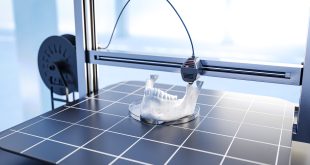The ten most influential ways in which artificial intelligence and machine learning are being leveraged to advance medical research and innovation
By Sean Tarry
One of the most incredible qualities shared by both the life sciences and biomanufacturing industries is the fact that they are perpetually driven forward by a continuation of research into the unknown in efforts to uncover or reveal something new that will enlighten mankind further and broaden our understanding of life on the planet and the ways in which to properly utilize and protect it. Aiding much of the more advanced research that’s being conducted today by scientists all over the world is the power and precision of artificial intelligence (AI) and machine learning. Considering current innovations and breakthroughs within the life sciences and biomanufacturing sectors, as well as those that will be enabled in the future, here is a look at the top ten ways in which AI and machine learning are helping to revolutionize healthcare.
- Drug discovery and design
With respect to the current and future health and well-being of the people living on the planet, there are few areas of research more important than that of drug discovery and design. Currently, on the discovery side, AI algorithms are being used to help identify ideal candidates for drug trials while predicting the efficacy and safety of those drugs and medications, streamlining and significantly fast-tracking the entire drug discovery process. And, on the design side, similar algorithms are being leveraged to predict how certain compounds might interact with a range of biological targets, allowing manufacturers to optimize their compounds to enhance efficacy and reduce the presence of negative side effects. - Clinical trials
When testing newly developed drugs for potential introduction to the market, it’s imperative that drug manufacturers gather the most ideal, diverse group of trial subjects possible in order to test the efficacy and effects of drugs. AI algorithms can help identify patient populations significantly quicker and with less cost than traditional methods would have allowed.
3.Medical device design
Another area where great strides are being made thanks to the introduction of AI is that of medical device design. The advanced computational power of AI allows for the effective execution of this complex and difficult process with extreme accuracy and efficacy, helping to create medical devices that are highly effective within sensationally optimized designs. Part of this optimization involves the determination of the different materials, sizes, and shapes that a device might be constructed into, benefitting designers a great deal by empowering their decision-making with information and insights, while reducing the time and cost associated with their development and introduction to the market.
- Personalized medicine
One of the most impressive and meaningful impacts that AI has had on life sciences to date has got to be the support it’s providing toward the development of personalized medicine. Working with an innumerable number of datasets, AI can be leveraged to generate insights based on biomarker information and other data in order to personalize treatment plans based on an individuals’ specific needs and reactions, reducing costs for patients and the healthcare system while optimizing the efficacy of treatments. - Medical imaging analysis
When it comes to the proper medical diagnosis of patients, medical imaging tools like MRI and CT scans are incredibly valuable in helping physicians achieve efficacy and accuracy. Unfortunately, a number of variables, including human error and misinterpretations, lead to inaccurate readings and, therefore, incorrect diagnosis of patients. Through the power of AI, these types of medical images can quickly, easily, and accurately be read and analyzed, enabling the early detection of diseases or other ailments, empowering physicians and eliminating the need for further diagnostics and testing. - Electronic health record analysis
One of the most dramatic evolutions currently taking place as a result of the influence of AI is the transformation of electronic health records and the ways in which they’re now being leveraged in digital form. For instance, AI-driven programs have the ability to scan and analyze the records of individuals, helping to identify signs that might indicate a problem or complication that needs to be addressed earlier than physicians might be able to. This type of revelation and advancement allows healthcare providers with the ability and confidence to make more informed decisions regarding the care they prescribe, improving outcomes for patients. - Disease diagnosis
As a result of the vast amounts of data that AI is capable of analyzing, immense improvements are being made to diagnosis, especially in cases that have traditionally presented challenges to physicians and technicians in properly and accurately identifying diseases and ailments that have until now been next to impossible to detect until it’s too late and the disease has advanced within an individual to a dangerously progressed stage. AI allows for the analysis of these vast amounts of data, recognizing patterns and trends that might present indicators that enable physicians to catch things they may not have been able to catch prior to the development of algorithms that can scan and disseminate massive amounts of data enhancing the accuracy of diagnosis and, in some cases, patient outcomes. - Genomics research
There are few areas of research and study that are more important to the advancement and protection of life on earth as that of genomics. It is, however, laborious work that requires an extraordinary amount of analysis in order to understand each individual organisms’ DNA sequence and the ways in which genes function and interact. As is the case with many other areas of medicine and healthcare, the use of AI facilitates the research and work being done around genomics, expediting medical advancements further by enabling scientists to identify genetic variations within organisms that make them susceptible to disease and prone to certain weaknesses. And, based on this information, scientists are then able to develop appropriate therapies to correct or treat disease and sickness. - Predictive analytics
An area where AI has yet to make a significant impact, but one where it seems placed on the precipice of major advancement, is its potential to predict. So, in addition to its remarkable ability to help physicians identify disease and sickness earlier than ever before as a result of the analysis of large amounts of medical data and patient records, it will soon have the ability to see into the future, if you will, to warn patients and physicians of the likely development of disease, and to predict the potential efficacy of certain treatments. - Patient monitoring
Another revolutionary impact that AI will increasingly have on healthcare, improving outcomes for patients, is its ability to monitor the health of individuals, in real-time, remotely, 24 hours a day. By equipping patients with medical devices that can read their vitals and other levels like glucose or blood pressure, AI can assist physicians in monitoring patients, and alerting them to respond if medically required. This advancement poses the potential to improve the efficacy of treatments, empower physicians with more information, and improve the overall quality of healthcare provided. As a result, the possibilities presented by AI’s power to predict could prove to be the greatest purpose that the technology ultimately serves.
Given the current capabilities that AI presents scientists, physicians, technicians and researchers all across the country, it’s no wonder that the technology is making waves. However, looking ahead, it seems that the potential that AI poses is even greater than anything we’ve experienced within biomanufacturing and life sciences to this point, and that we are, indeed, on the tipping point of a revolution within the industries that is set to result in massive improvements to the ways in which we study, diagnose, and treat patients going forward.
 BioLab Business Magazine Together, we reach farther into the Canadian Science community
BioLab Business Magazine Together, we reach farther into the Canadian Science community





